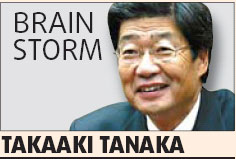

In 1978 China embraced the reform and opening-up policy, which gave multinationals the access to the world's most populous country and now the most dynamic market. However, Japan's Toshiba has a much longer presence than its peers as it already made its first foray in 1972 when China and Japan normalized their diplomatic relations. During an exclusive interview with China Business Weekly reporter Li Weitao, Takaaki Tanaka, chairman and president of Toshiba's China operations reviewed the firm's development in the country.
Q: In 1995 you started overseeing Toshiba's Asian operations and in 2005 you took charge of Toshiba's overseas businesses. Now as the chief of Toshiba's China operations, what changes do you think have happened to China's position in Toshiba's radar screen?

A: The trade between China and Japan has been on a rise since the two countries normalized their diplomatic ties in 1972. After China embraced the reform and opening-up policies, Toshiba exported industrial equipment, coal-fired power equipment and home appliances in large volume to China.
In the first half of 1990s, Japanese companies including Toshiba, in a bid to cope with intensifying global competition and increase cost effectiveness, started direct investments in China and established a number of manufacturing bases.
In the second half of 1990s, Toshiba started aggressively attacking China's domestic market and forging joint ventures with local partners. Since then we regarded China as the major market for our manufacturing facilities in the country.
In 2000 we started ramping up our marketing campaigns in China. Now we already have 69 subsidiaries or joint ventures compared to 2 in 1991.
Q: When looking back, what right decisions do you think Toshiba has made in the past few years since 1972? Was there any decision you feel regretful about?
A: I'm pleased Toshiba made its advance into China much earlier than other Japanese companies. As a result, Chinese people had chances to understand Toshiba's brand and technologies as early as 1970s and that has established Toshiba as a premium brand in China. For instance, we had been the No 1 player in China's office copier market for eight consecutive years. And our catchphrase for TV commercials, broadcast starting from 1980s, remains fresh in many Chinese people's memories.
However, an economic recession hit Japan in 1990s, which put a brake on Japanese companies' overseas sales and investments for about ten years. In contrast, investments by European and US companies shifted into high gears and established their leading positions in the infrastructure sector. In home appliance sectors like television products, South Korean firms also made great strides with their aggressive investment strategies.
Now Toshiba is in a fast lane with approximately 20 percent annual growth. We are facing stiff competition but in a long term I'm quite optimistic about Toshiba's prospects.
In a country with a history of more than 5,000 years, it doesn't make sense if you make plans with predictions for just 2-3 years. When working on your corporate plans, you should cast your sights on 2020 or even 2050 and then come back to your three-year plans.
Recently I attended a forum in Beijing at which Zhang Guobao, vice-minister of the National Development and Reform Commission (NDRC), said China hopes its nuclear power generation could account for 5 percent of the total by 2020. In the power sector, even one percentage is a big thing. The goal means China could increase the number of nuclear power plants to more than 30 from 11 now.
It is also said China expects nuclear power generation could account for half, with hydropower and coal-fired power sharing the remaining. The build-out of infrastructure needs a long-term plan. In terms of energy strategy, in particular, you need look beyond 2050 at least.
In fact, we make plans within each three years. That requires us to make the right predictions about what will happen to China by 2020 or even 2050.
Q: Multinationals are now coping with a growing number of challenges in China such as the unified income tax rate (for domestic and foreign companies) as well as the possible cost rise resulting from a new labor contract law. What's your comment on that?
A: The unification of the income tax rate as well as the introduction of the new labor contract law are in line with the social development in China and are an indication businesses are getting mature in the country.
Business activities have to be well planned. And businesses need some time to prepare for the new laws or regulations. We hope we could get enough time to adjust ourselves before a new law or regulation is enacted and implemented. I suppose, that is a difference between Japan and China.
However, anyway, as we have been upholding our corporate social responsibility guidelines, we will try our best to learn and understand China's laws and regulations and strictly observe them in our business activities since we are doing business in the country.
(China Daily 04/28/2008 page6)













